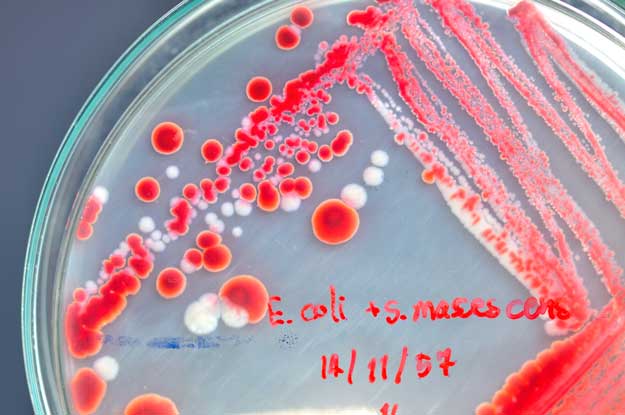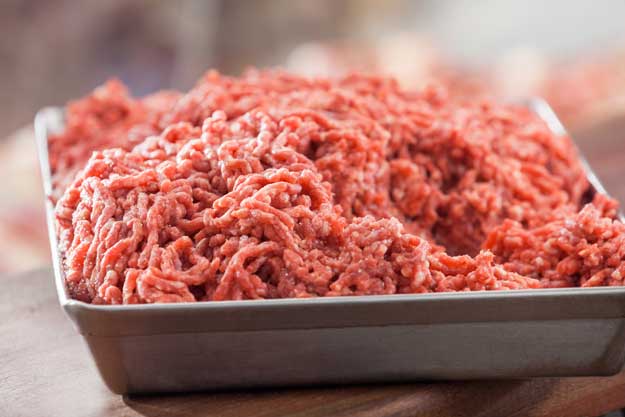If you love ground beef, you probably shouldn’t read this article.
Consumer Reports Says Your Ground Beef Isn’t Safe
How often do you eat ground beef?
That question has now become synonymous with how often you eat fecal matter.
In a report published by Consumer Reports, it was found that 100% of ground beef – conventional and organic – contains fecal matter.
Let’s dive in deeper to see how Consumer Reports conducted their study and what this means for ground beef-lovers around the country.
The Risks

While all meats contain a certain percentage of toxins – such as E.coli, salmonella and other strains of bacteria – ground beef poses the most risk as it is a meat we tend to consumer either medium-rare or rare. Other types of meat, like chicken, turkey and pork, contain the same amount of bacteria, but are consumed well-cooked which makes them safer to eat.
Bacteria gets on meat through the slaughtering and processing stage but, as is the case with the safer kinds of meat, stays on the surface of the meat and is destroyed once cooked. With ground beef, the bacteria gets mixed throughout, thus contaminating every centimeter of the meat. Are you grossed out yet? Because we kinda are.
Another factor contributing to ground beef’s toxicity level is that the meat and fat trimmings often come from multiple animals, so meat from a single contaminated cow can actually end up in many packages. The entire process from slaughter to cooking goes through various stages in which cross-contamination can occur.
I think everyone remembers the E.coli outbreak that occurred back in the early 2000’s, right? Between 2003 and 2012, 80 ground beef-related E.coli outbreaks occurred sickening 1,144 people, hospitalizing 316, and killing 5.
As recently as one year ago, 2 million pounds of contaminated beef were recalled. Watch the chilling news piece below:
And just when we thought we had moved past contaminated beef and into stricter food safety laws, this report proves otherwise by showing that regardless of what kind of beef you’re buying – conventional or grass-fed – all ground beef contains some level of fecal matter and bacteria. Let’s get into the study below.
The Study
Consumer Reports (CR) carried out their study by first purchasing 300 packages – which equates to 458 pounds and 1,832 quarter-pounders – from 103 stores in 26 cities across the country. The stores they purchased their beef from varied from big-box to natural food stores and they purchased both conventional and grass-fed beef.
Conventional beef is the most commonly purchased kind of beef and usually the kind you’d find at supercenters such as Target and Walmart. Conventional beef is raised on antibiotics and other drugs (hormones) that promote rapid growth and immunity to disease and illness. The rampant use of antibiotics has made conventional beef (and to an extent, its consumer) resistant to common strains of bacteria. Conventional beef also comes from cows that were raised on feedlots and were fed a diet of soy and corn.
Grass-fed beef, on the other hand, comes from cows that were not given antibiotics, allowed to roam on pastures and fed an organic diet.
CR tested for 5 different types of bacteria: clostridium perfringens, E.coli, enterococcus, salmonella, and staphylococcus aureus and, let’s just say, their findings were none too pleasant.
The Findings

- all 458 pounds of beef contained bacteria that signified the presence of fecal matter.
- 20% contained C.perfringens, a bacteria that poisons over 1 million people per year.
- 10% contained S.aureus, a bacteria that can’t be destroyed with cooking.
- 1% contained salmonella, a bacteria that causes over 1.2 million illnesses and 450 deaths in the country per year.
It was also found that conventional beef was at a higher risk for containing bacteria than grass-fed beef. In addition to its high risk, conventional beef also contained antibiotic-resistant strains that were more likely to get passed on to its consumers, thus putting them at risk for serious illness. Conventional beef contained:
- an antibiotic-resistant strain called S.aureus bacteria
- superbugs – a bacteria bacteria that is resistant to 3 or more classes of antibiotics
And while it’s safe to say that conventional ground beef definitely poses a higher health risk than grass-fed beef, it was shown that grass-fed beef still contains the same bacteria strains, just at lower levels.
So, what does this mean for you, beef-lovers? Should you stop eating meat altogether? Should you boycott factory farming and demand cleaner sources of meat? Or should you resort to the fetal position and wait until this all blows over?
Read the full report here.
Will You Stop Eating Ground Beef?
If you love ground beef, don’t despair. You don’t have to stop eating it, all you have to do is #BuyBetterBeef. Demand changes in the factory farming system because what’s good for cows is good for consumers. Demand that cows be allowed to roam free, eat an organic diet and not be given antibiotics and drugs which then get passed down to the consumer. Demand that cows be given better lives with better treatment and in better conditions.
And one way you can do this is by voting with your fork. By only choosing to purchase grass-fed, organic beef you are saying that you are against disease-ridden, bacteria-laden conventional beef and want better conditions for your beef and yourself.
We don’t have to subject ourselves to eating food that has the potential to make us sick. We can either choose to change the status quo or resign ourselves to a lifetime of illnesses.
What are you going to do?
Let us know in the Comments section below!
Don’t forget to keep in touch, foodies!
Sign up for our daily newsletter here!
Do you have Instagram? Don’t forget to follow @HomemadeRecipesOfficial.
Click here to Like Us on Facebook.
Click here to Follow Homemade Recipes on Pinterest
Leave a Reply